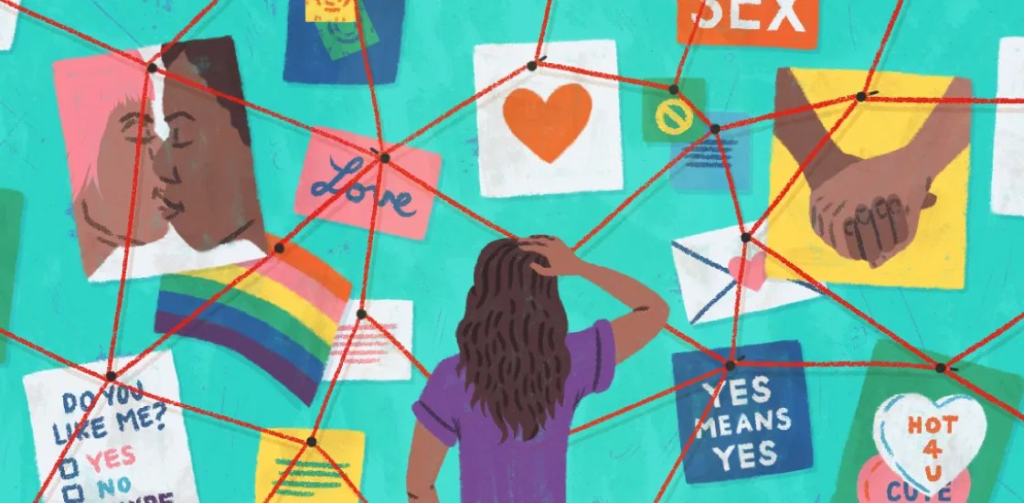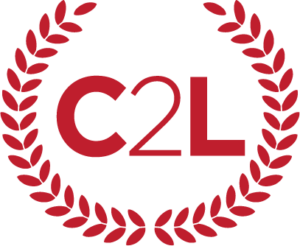 Our long-time Academic Coordinator, Kelly Weiss was kind enough to respond to an extensive interview about one of the most progressive and detailed classes that the College Experience has to offer. The Sexuality Class is meant to allow students the education, tools, and facts of life that are necessary in order to make healthy decisions while maintaining autonomy with their own bodies. Here are the questions as well as her comprehensive answers. She was also kind enough to provide us with illustrations depicting the awesomeness of this particular class. The other instructor is Emily Padula who is our Habilitation Specialist Enhanced. She co-teaches alongside Kelly in this class where no question is off-limits.
Our long-time Academic Coordinator, Kelly Weiss was kind enough to respond to an extensive interview about one of the most progressive and detailed classes that the College Experience has to offer. The Sexuality Class is meant to allow students the education, tools, and facts of life that are necessary in order to make healthy decisions while maintaining autonomy with their own bodies. Here are the questions as well as her comprehensive answers. She was also kind enough to provide us with illustrations depicting the awesomeness of this particular class. The other instructor is Emily Padula who is our Habilitation Specialist Enhanced. She co-teaches alongside Kelly in this class where no question is off-limits.
Tell us about the development of the Sexuality Class. When was it first added to the curriculum, and why did you believe at the time that it would be a good addition to the College Experience? Is this a required class for all students to take at some point in their two years as a student?

Sexuality class, in some form, has been part of College Experience since the beginning, but it has evolved based on changing student needs. It is a required class during astudent’s first year in the program. It often appears on the schedule for seniors as well, before they move on from College Experience. Anyone who teaches sexuality classes goes through the Elevatus training, which focuses specifically on teaching sexuality to individuals with disabilities. It’s a fantastic program. Much of our curriculum is based on the materials given during this training. We use the Elevatus curriculum and the circles of sexuality as our framework for the class. It’s important for every teacher to leave their own personal values out of the lessons. We don’t teach values, we teach facts. There is no judgment. We don’t instruct students to choose one particular path. We encourage students to discover what makes sense for them and to pursue it in a healthy, productive way, while respecting the rights of others.
We now offer adult education sexuality classes for graduates of College Experience and other individuals who receive services from Living Resources. One class is located at the College of Saint Rose starting May 3 and the other is at Living Resources’ Beekman Street Studio in Saratoga starting May 18th. We also offer an adult education Life Organization/Money Management class at Saint Rose starting May 2. Anyone interested in these classes can get in touch with me at kweiss@livingresources.org for more information.
I am sure the class talks a lot about “consent” as far as someone else allowing for sexual relations or the student’s ability to understand the risks involved as well as the actual mechanics of being intimate with someone else. How do you teach consent in this class, and what is the process of ensuring a student has the ability to consent to sexual intercourse with one of their peers in the program?
We talk A LOT about consent, relating to sexual activity, but also in general terms as well. We reinforce that a student can say no to anything at any time and they don’t always have to give a reason. We teach, “No. A complete sentence.” Students learn and practice ways of communicating this with each other. We teach students that it is their responsibility to speak up if they feel uncomfortable, but also the other person’s responsibility to notice signs of discomfort and check-in throughout to make sure it is a consensual act. We collaborate with Saint Rose’s Title IX office, Albany County Crime Victim and Sexual Violence Center, and Planned Parenthood to develop our curriculum on consent. Here is an image from Planned Parenthood that we use to help students remember all the components of consent:
Evaluating consent: We teach the students about this, but the actual evaluation is not part of the class. It is NYS law that dictates this. It is called an informed consent evaluation, which was developed by the agency, YAI. Anyone who conducts the evaluation needs to go through their training first. Students are asked questions about mechanics of sex, safety, exploitation, etc. The purpose is to determine if the individual possesses enough knowledge to make an informed decision. The evaluation is then brought to our Sexual Rights and Advocacy committee who reviews and makes a final decision-consenting (the person can engage in sexual activity if they want to) or non consenting (at this time, the person doesn’t have enough knowledge to participate in sexual activity. Education is suggested and provided). Someone can be evaluated as many times as they want. The language can be confusing, so we spend a lot of time talking about the importance of always getting consent regardless of a person’s consent status.
These subjects can be very uncomfortable for people to discuss especially when it is teacher-to-student. How does the class and the actual program get around some of the jitters that occur when these subjects come up in random conversation? Are your teachers trained to handle sexual questions outside of class?
We acknowledge the discomfort that people may feel for different reasons. For some, this is a topic that they have never even discussed before. We encourage students to take care of themselves and let us know what we can do to increase their comfort. Historically, students with disabilities are often blocked from this education. This is getting better each year, but we still see students who weren’t offered Health class or were taken out of class during the “sex ed” topics. We strongly believe that everyone deserves access to this information, as adults who have the same needs and desires as any other adult. What often results if this education is not provided is high risk, life-changing behavior. Elevatus sexuality educators are trained in 1:1 conversations that occur outside of class, as well as working with parents who may be fearful of these topics. We also offer training for staff to help them navigate topics as they come up, as they naturally will. For most discussions, we encourage them to validate and refer to a sexuality educator.
How have your students fared when engaging in intimate relationships with their fellow classmates? Are there any supports provided in regards to procuring birth control or making sure they are safe while having sexual relations?
Students have had many of the same experiences as anyone else engaging in intimate relationships-sometimes it goes well and sometimes not so much! We are there to provide support and guidance as students navigate these complicated relationships. Working in partnership with families, we have assisted students in procuring different methods of birth control and getting tested for STIs. We provide the education/support/guidance and it’s up to the students to make their decisions.
Could you give us a rough idea of the syllabus and curriculum within your Sexuality Class, Kelly? What subjects do you cover throughout the semester, and what are the main goals of the class by the time it concludes?
The main goal is for students to be educated in the topics below. We want them to have the knowledge and tools to be sexually healthy adults.
Topics:
- Sexual identity-gender identity and sexual orientation
- Private vs. public
- Connecting with yourself and others
- Healthy Relationships
- How to meet people and how to ask someone on a date
- Communicating with a romantic partner
- Body parts
- Advocacy
- Consent
- Sexual feelings and pleasure
- Sexual acts
- Reproduction
- Birth control
- STIs
- Protection
- Sexual decision making
- Sexual harassment
- Sexual abuse





 What comes after graduation? Many College Experience students, in fact most, choose to remain in Albany. They maintain friendships with their fellow and former graduates, form romantic partnerships, and some get married.
What comes after graduation? Many College Experience students, in fact most, choose to remain in Albany. They maintain friendships with their fellow and former graduates, form romantic partnerships, and some get married.